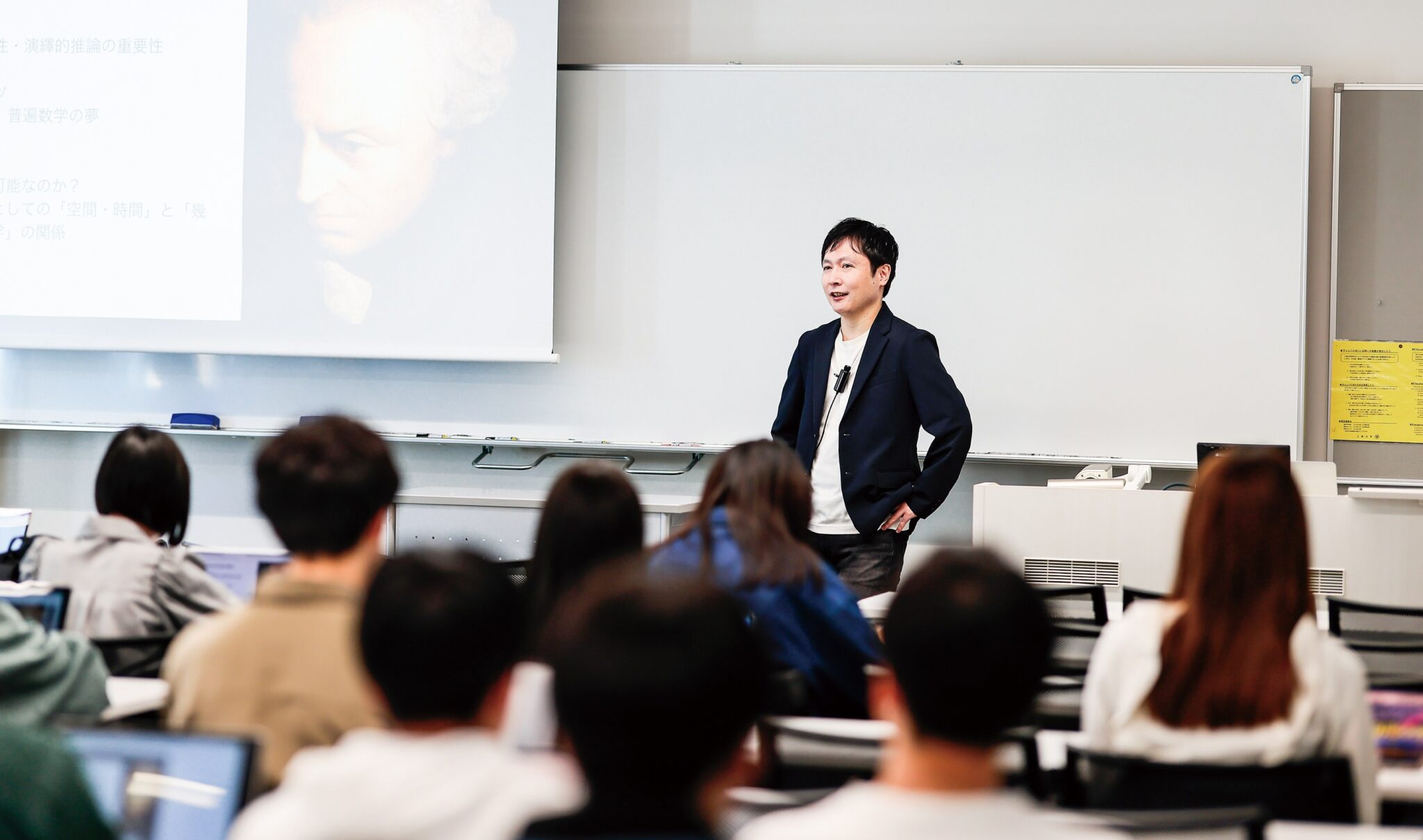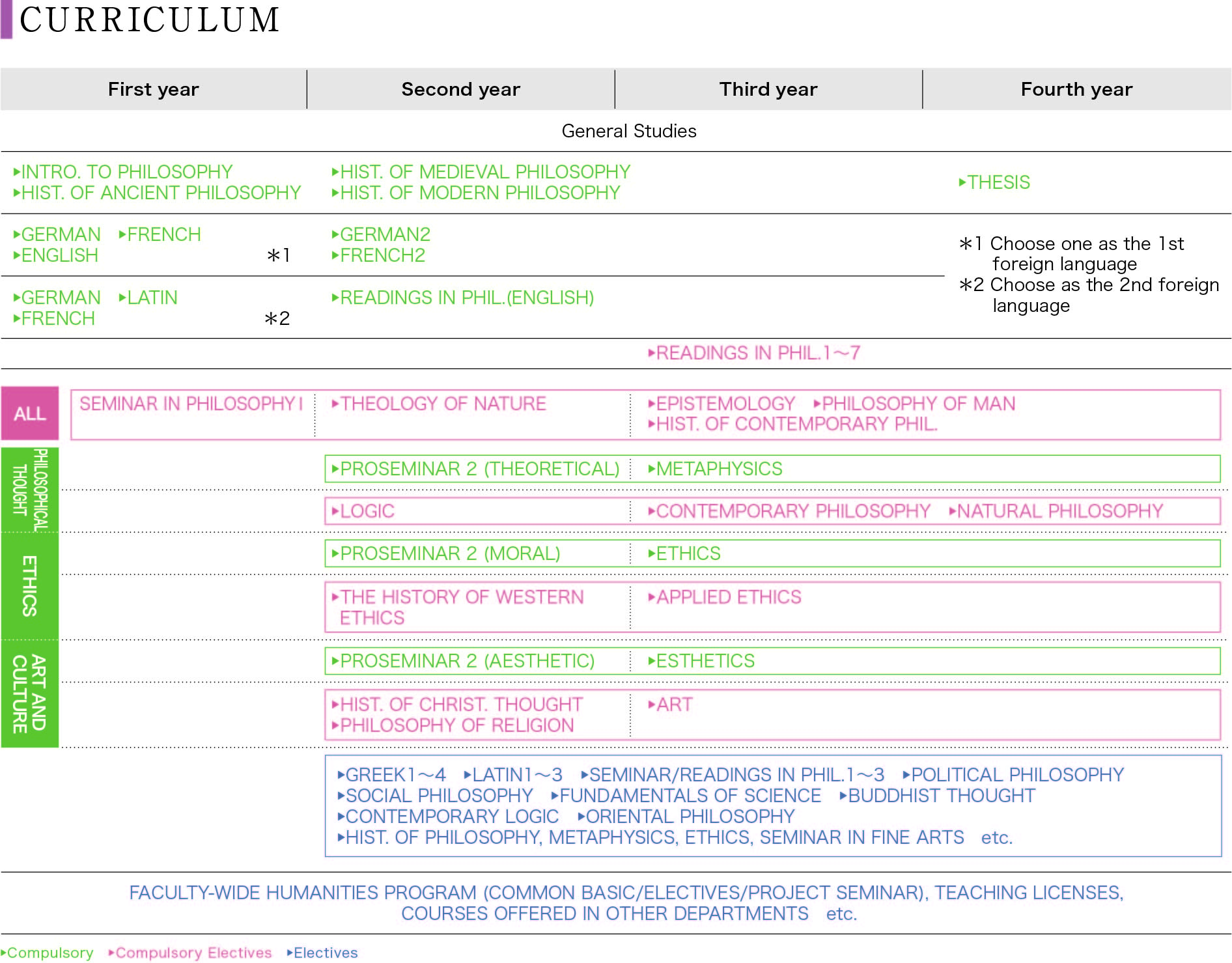Department of Philosophy


Department Features
The Department of Philosophy is one of the oldest and most traditional departments at Sophia University, having been established at the time of the university’s founding. It is also a department that represents the founding spirit of the university, “love for Sophia (wisdom),” or Philosophia (philosophy). We value an awareness of the “path” that opens up life for each student of philosophy. Based on this ideal, the department aims to nurture the ability of students with diverse personalities and beliefs to think independently, express themselves, and think together with others in order to grow as a whole person, and achieve self-realization.
To support their efforts and encourage their spiritual growth, the school provides a systematic education based on small class sizes. Many of our graduates are leading figures in the fields of publishing, journalism, art, politics, and religion, as well as researchers, teachers and public servant.
Curriculum
In the first year, along with introductory courses such as small-group exercises, the program offers introductory courses in philosophy and courses that unravel the history of philosophy. In addition, students choose their first foreign language (German, French, or English) and second foreign language (German, Latin, or French) to study. From the second year, students choose one of three series of courses: “Philosophy and Thought,” “Ethics,” or “Art and Culture,” and study specialized courses centered on seminar-style classes. To learn philosophy from a wider perspective, students are able to take courses outside the course they have chosen. Throughout the four years, many small-group exercises and literature reading courses are offered to cultivate the ability to “think independently, express oneself, and think together with others.”
as of 2022
* Please refer to the syllabus for more information on the courses.
Course Examples
- Introduction to Philosophy
The program explores the existence of questions for deep thinking by addressing 11 themes (philosophy and scholarship, ethics, language, personal identity, time, art, history, related to religion, etc.) that evoke philosophical thinking.
- Seminar in Philosophy I
This course offers small-group seminar-style instruction covering the concepts necessary for studying philosophy, how to interpret and analyze texts, prepare reports and papers, give oral presentations, and conduct collaborative research, and find references.
- Proseminar II
This is a seminar-style class conducted in each of the three courses. Students develop the skills they have cultivated in “Seminar in Philosophy” by reading assigned literature and also experiencing presentations and discussions to enhance their specialized research skills.
- History of Medieval Philosophy*
The course traces the flow of ancient patristic and medieval philosophy from the 2nd to 16th centuries, taking into account the social, educational, and religious context. Students will deepen their knowledge of the development of philosophical thought and the ideological motifs of major thinkers.
- History of Ancient Philosphy*
The course will unravel the history of classical Greek philosophy from its formation to its later development, with a focus on Plato and Aristotle. Students will gain a basic understanding of the fundamental question of what philosophy is about, and acquire basic concepts such as idealism, and hylomorphism.
- History of Modern Philosophy*
This course provides an overview of approximately 600 years of Western philosophical ideas from the 13th to the 19th century, featuring many of its thinkers. Students will acquire objective knowledge and develop their own ideas on cultural ideologies.
* Core courses in the Department of Philosophy
Available Teaching Licenses and Subjects
- First Category Teaching license for Junior High School (Social Studies)
- First Category Teaching license for High School (Civics)
Curatorial courses are available.
Educational Objectives and Policies
-
To cultivate excellent skills of thinking, comprehension, and expression through the study of philosophies from all ages and essential philosophical problems, in line with our university’s founding spirit of philosophia or the pursuit of wisdom
-
To produce researchers and educators in fields such as philosophy, ethics, aesthetics, and religion, and, with a view to holistic education, to foster an autonomous capacity to apply broad, deep insights for the purposes of self-actualization and development of cohesive societies.
-
With an aim to foster human resources who can contribute to modern society with a deep and broad understanding of humans and the world by conducting research in philosophy and thought from the fundamentals, based on the concept of “Philosophia,” the founding spirit of Sophia, the Department of Philosophy sets standards for the skills and knowledge students should acquire before graduation as described below. Those who fulfill the graduation requirements shall be deemed to have acquired these qualities and will be awarded a diploma.
- The ability to fully understand the details and meaning of philosophical issues associated with humans and the world, especially those pertaining to the basic values of “trueness,” “good” and “beauty,” and the ability to think independently.
- Adequate knowledge of the history of the human pursuit of philosophical issues and the ability to continue the pursuit with self-acknowledgement and a sense of responsibility for leading the research in the future.
- The ability to think about philosophical issues independently as well as with others and the skills to read and comprehend philosophical classics in the original text.
- The ability to observe the philosophical issues that lie at the root of various phenomena of modern society, to explore them based on philosophical knowledge and appreciation of liberal arts, as well as philosophical thinking skills, and to persuasively deliver outcomes.
- The ability to contribute to a world where various beings coexist, based on the philosophical knowledge, skills and attitude provided above, by living independently and “for others, with others.
-
In accordance with the Diploma Policy, the Department of Philosophy constructs its curriculum as follows:
- Foster a systematic understanding of various philosophical issues and philosophical thinking skills through “systematic courses” (Human Studies, Epistemology, Natural Theology, Metaphysics, Ethics, and Aesthetics
- Foster knowledge and a cultural understanding of the human history of philosophical pursuit through “philosophical history courses” (Ancient History of Philosophy, Medieval History of Philosophy, Modern History of Philosophy, Contemporary History of Philosophy).
- Foster the skills and practices to explore philosophical issues through debate and dialogue, the skills to read and understand philosophical literature and the language skills required in Seminar Courses and Literary Readings.
- Foster the skills and knowhow to independently engage in research by systematically identifying individual philosophical interests in terms of the three Course Groups: “Philosophical Thought,” “Ethics,” and “Arts and Culture.”
- Foster the skills and practices to independently plan and implement research and to present outcomes publicly and academically through Thesis Guidance and Thesis.
-
The Department of Philosophy welcomes students with the following qualities:
- Students who bear a strong interest and eagerness to identify the various challenges faced by humans and the surrounding world and to seek a fundamental understanding of the issues guided by self-initiative, dialogue and collaboration, rather than to solve them superficially.
- Students with a strong interest in “living for Others, with Others” by nurturing their strengths in thinking, judging and presenting through philosophy, defined as “love for wisdom and pursuit of knowledge.”
- Students who embrace standard knowledge and appreciation of culture associated with human society, culture and history, excellent comprehension and presentation skills in Japanese, and robust English skills.
Faculty Members
Hiroyuki OGINO Professor
Shigeo KAWAGUCHI Professor
Nobukuni SUZUKI Professor
Yuji NAGAMACHI Professor
Hajime SUGIO Associate Professor
